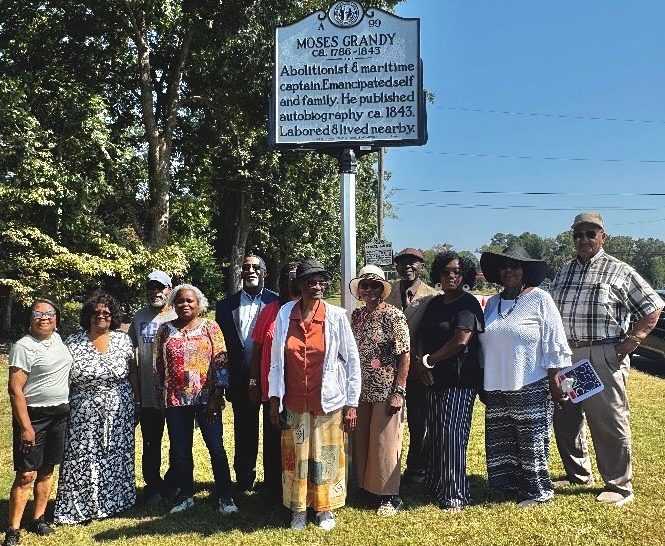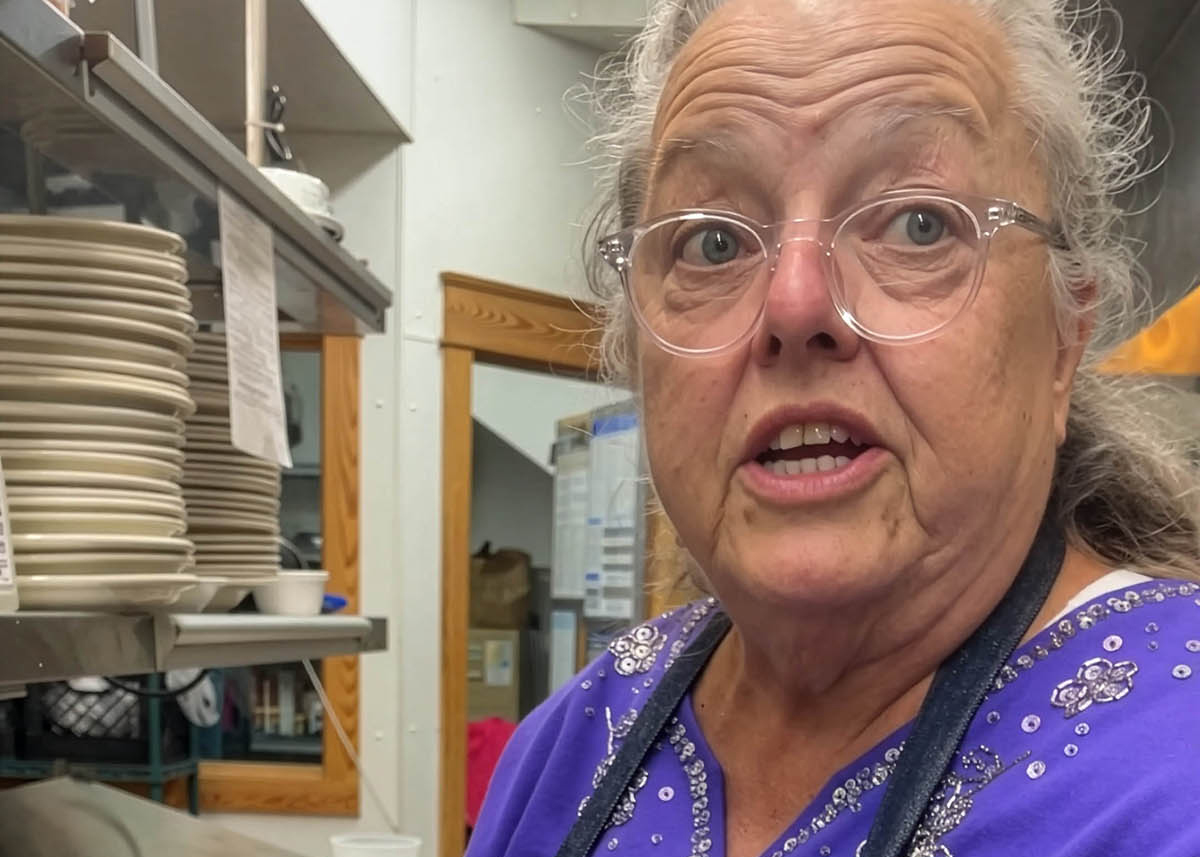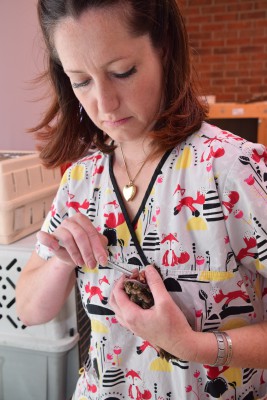
NEWPORT – Brooke Breen moves through the Outer Banks Wildlife Shelter swiftly, her movements careful and measured as she cups a baby bird in her hands. As an experienced wildlife rehabilitator and the shelter’s new executive director, she knows time is of the essence.
“It’s just like an emergency room, you never know,” says Breen. “It’s always going to be something.”
Supporter Spotlight
Just a little while ago, someone dropped off two abandoned grackle chicks. One had already died. Breen rushes to the second one to the baby bird nursery for a quick meal of Pedialyte, which is full of electrolytes a hurt bird would need.
“You’re dealing with a live creature that’s sustained some sort of trauma,” she says. “First thing they do to you in a hospital is give you an IV, same principle applies.”
Saving baby birds is just one event in the day in the life of the shelter’s new executive director, a role that keeps Breen on her toes and working overtime.
“This is my sole focus. Technically, I’m here four days a week, but usually its six,” she says.
As a mother to an almost two-year-old son, Breen, 39, has her hands full at home and in the shelter. Fortunately, she has two decades of experience working with wildlife and a bachelor’s degree from North Carolina State University in zoology to help her out.
Supporter Spotlight
Breen has a strong connection with the community, and still lives in the house she grew up in Emerald Isle. Her father, Russell Covert, was a longtime teacher at White Oak Elementary School in nearby Cape Carteret, and her mother, Christine, was an assistant principal in Craven County.
She says her love of wildlife started early, and that she did not choose animals.
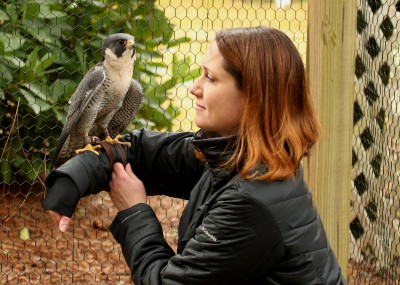
“They chose me,” she says. “I would stumble across them and I just kind of ignored it and played it off as long as I could.”
Compelled to help animals, Breen began volunteering at the shelter at the age of 17 as a junior bird feeder. Over the years, she continued to volunteer or work part-time at the shelter, even while working as an emergency dispatcher, chemistry teaching assistant at Carteret County Community College and silversmith apprentice, among other jobs. She became the executive director of this sprawling, two-acre compound in January.
“I’ve worked my whole adult life to be able to have this opportunity,” she says. The goal of the nonprofit is to care for injured, sick and orphaned wildlife, rehabilitate them and release them back into the wild. The shelter serves a variety of species, including birds, like owls and pelicans, reptiles, like turtles, and small mammals, like rabbits.
Occasionally, an animal may be too permanently injured to be released. The shelter cares for them and uses them for educational purposes. The shelter hosts summer art and wildlife camps for children, where they can learn about the natural world.
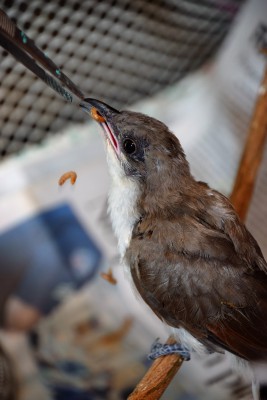
Breen says she loves the job of running the place and that she’s fortunate her work is her passion. “Some people, this is what they’re supposed to do,” she says.
Breen has a deep connection with the animals she cares for. That was apparent with Phoenix, an injured peregrine falcon and a permanent resident that recently died.
“I started working with him when I was 18 years old,” Breen says, as she tears up a bit. “We knew each other for a very long time and he was a good friend.”
She adds that she and her staff of four also take animals home on a regular basis to give them the around-the-clock care they need.
“I’ve had to go home with 20-something possums,” Breen says, “that have to be tube-fed every three hours.”
Some animals may die during rehabilitation or may have to be euthanized due to extensive injuries. However, Breen says she has never turned an animal away from the shelter. The shelter released about half of the 1,300 animals it received last year, a rate Breen says is good given the precarious state many animals arrive in and the delicate nature of local species, especially water birds.
The community has helped the shelter rehabilitate animals. For example, Lowe’s Food in Cape Carteret donates day-old meat, the boy scouts have held donation drives and cleaned up the nature trails and a church group once redid the shelter’s floors. Breen says she’s grateful for the effort the community has put in and that the shelter still needs as much help as it can get.
“The more volunteers that we have to support the staff members, the more time that the staff members, who have all this expertise in animal medicine, are able to spend with the patient,” she says.
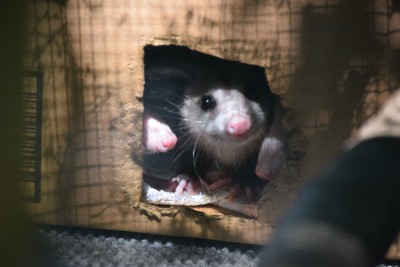
The care of baby birds in the spring highlights the shelter’s need for extra hands.
“Baby birds have to be fed every half an hour from sun up to sun down,” she says. That’s 24 hand-feedings for each bird, every day.
In addition to volunteers, she says, the shelter could use donations, whether its monetary, cleaning supplies or frozen meat.
Fish, she says, is a particular need that is hard to meet.
“Pelicans will eat their weight in fish every day,” she says. “If we’ve got 10 pelicans, that’s a whole lot of fish.”
Breen says one of her biggest challenges coming into directorship was making community members aware of the shelter’s existence, prompting her to start a Facebook page for the shelter.
“This is our expertise. We want to help these animals and we want them to know that we are in the community,” she says.
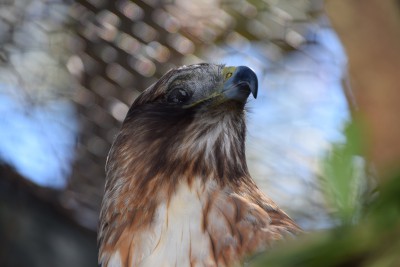
When she’s not on the phone, making connections within the community, or in Raleigh, meeting with wildlife officials, or in the outdoor enclosures, checking on opossums for release, Breen says she likes to take a 20-minute break by the pond every once in a while to escape the constant noise of the shelter.
There were times, Breen says, when she tried to fight the urge to care for animals. She says they kept finding to her.
“They still come to me,” she says with a laugh. “I guess I’ve got to kind of stick with it.”




